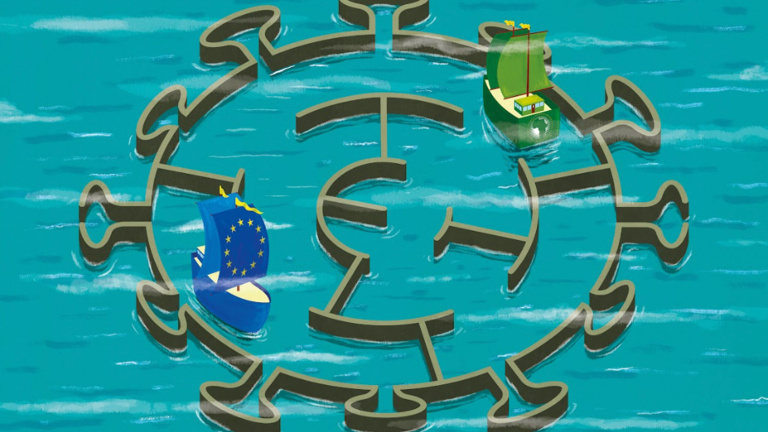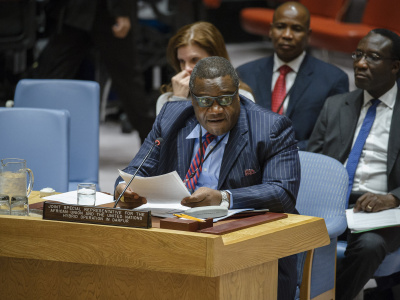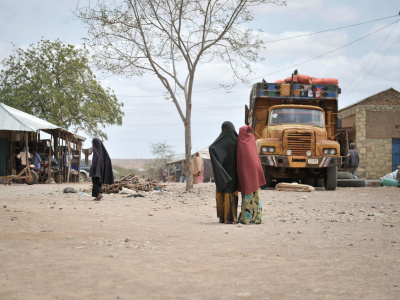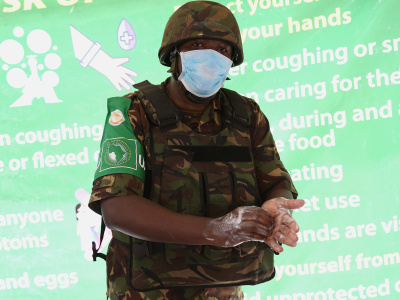
How can we judge the AU-EU partnership on peace and security?
Peace and security is a key policy domain in the EU-Africa partnership, due to be renegotiated at the AU-EU Summit next year. Europe and Africa have a long history of cooperation in this area. Though less contentious than other domains of the planned partnership agreement – such as climate change, migration and economic growth – sensitivities do remain, due to the strategic interests of the EU as well as the governance challenges facing the AU.
Facts and figures about the EU-AU partnership on peace and security
African leaders put peace and security high on the agenda of the African Union (AU) from its inception in 2002. Major motivating factors were experiences of inter-state war and genocide in the 1990s and the drive to take more responsibility for security on the continent, to avert the influence of external actors. This resulted in the design of the African Peace and Security Architecture (APSA).
The APSA introduced several pillars and a range of new institutional arrangements and decision-making processes for conflict prevention, conflict management and peacebuilding. The Peace and Security Council was created as the APSA’s central organ, alongside the Continental Early Warning System, the African Standby Force, the Peace Fund and the Panel of the Wise. The APSA was supported from its inception by the Peace and Security Department of the AU’s newly created secretariat, the AU Commission (AUC). Institutionally, the APSA has embraced and worked with the continent’s two regional mechanisms (RMs) and eight regional economic communities (RECs), tasked to coordinate regional economic integration and peace and security processes.
The European Union (EU) is one of the AU’s main peace and security partners, second only to the United Nations (UN). Between 2004 and 2019, the EU provided some €2.9 billion in financial assistance to various African peace and security efforts through the APSA via the African Peace Facility. Most of this money (93%) was spent on peace support operations, with the majority of funds going to Somalia (AMISOM). Major funding also went to the African Multinational Joint Task Force fighting Boko Haram in the Lake Chad region (MNJTF) and to the G5 Sahel Joint Force of ‘G5 Sahel’, a framework for coordinating regional development and security matters in West Africa. Some 6% was spent on strengthening the institutional capacity of the AUC, and 1% went to the Conflict Early Response Mechanism (Figure 1).
The EU support is sorely needed, considering the various national and regional conflicts ongoing in different parts of Africa. In 2007, peace and security became one of the eight partnerships of the Joint Africa-EU Strategy (JAES) and remained one of the priorities of the partnership. In addition to the financial support provided, the EU established a delegation to the AU in Addis Ababa to accompany JAES implementation. The AU maintains its own Permanent Mission to the EU in Brussels.
Figure 1: APF contracted amounts per activity, 2004-2019 (in millions of euros)

Note: This figure does not include €13.8 million for audit, evaluation, communication and technical assistance. Source: ‘African Peace Facility Annual Report 2019’, European Commission, p. 10.
Nature of the peace and security partnership
The EU and AU have multiple common peace and security objectives and priorities. The EU’s Joint Communication ‘Towards a Comprehensive Strategy with Africa’, adopted in 2020, broadly sides with the AU’s ‘Silencing the Guns by 2020’ initiative and the longer term goals of the AU’s ‘Agenda 2063’. The AU highly appreciates the European support, and the policy dialogue between the two sides is overall constructive and pragmatic, though with regular irritations and some strong frictions.
One such hiccup occurred in 2017, when the EU instituted a 20% cut in its payment for stipends for the African peace support operation in Somalia (AMISOM), citing concerns about the sustainability of AMISOM’s dependence on EU finances. Mounting a fierce opposition, African states asserted that the planned cut devalues the substantial contributions made by African states and their soldiers, who were contributing their finances and also ‘blood and sweat’ to counter terrorism. They reasoned that terrorism is a global threat and hence a global responsibility, even if counterterrorism operations take place in Africa. The EU on the other hand indicated that it is being regarded like an ATM machine, and expressed dissatisfaction at the slow progress in reforming the AUC to boost the AU’s financial autonomy and clarify the relationship between the AU and RECs/RMs. This last issue has still not been fully resolved. The EU in Brussels, strongly backed by the member states, stepped up its bid to go from being a mere ‘payer’ to a ‘player’, not only in Africa but in its external action writ large.
Institutional reform, and with it, the imperative to secure predictable and sustainable finance for peace and security, has been an issue prominently addressed since 2018, when Rwanda chaired the AU. As part of these institutional reforms, the AU tabled a proposal by Donald Kaberuka, the AU High Representative for Financing the African Union, to increase AU’s financial autonomy by expanding member states’ contributions. Kaberuka’s plan introduced a 0.2% levy on eligible imports to all African countries, enabling the AU to collect €1 billion annually from its member states. That money would cover all of the AU’s operational costs, 75% of its programmatic costs and 25% of the costs of the peace support operations. The AU considered a 25% contribution to peace support operations fair, given the economic strength of AU member states and the fact that peace is a global public good which requires global contributions.
So far, close to 70% of the Peace Fund’s target has been reached. This is encouraging, but far from securing the financial sustainability of African peace and security policy. The AU thus seems likely to be reliant on international partnerships for some time to come. This recognition has invigorated the AU’s negotiations with the UN to secure 75% of its costs for peace support operations from the UN’s assessed contributions.
An interest-driven partnership
The AU-EU partnership on peace and security has always been driven by shared interests, even if the details have sometimes diverged. Indeed, alignment is tough to achieve, both at the trans-continental levels and between the individual AU and EU member states.
In Africa, member states of the AU do not always play in accordance with continental positions and decisions. They at times prioritise national interests over shared regional or continental objectives. The continent’s diversity also makes it difficult to arrive at shared continental objectives. The fissures that open up provide space for external actors to exercise influence in Africa. This is a topic of discussion among AU member states and is one of the principal reasons why the AUC is pushing to represent Africa as a unit and to negotiate the next Africa-EU partnership.
In Europe there is also fragmentation in external action, both between EU member states and between the EU Commission and member states. There is no collective European foreign policy strategy, and intentions on how the EU wants to engage in external action are described only broadly in documents such as in the EU Global Strategy, drafted in 2016. While EU member states have their own national geopolitical interests and varied bilateral roles in different parts of Africa, the EU’s main focus is on its neighbourhood (North Africa) and the extended neighbourhood in Africa north of the equator (figure 2). EU member states have contributed personnel to UN peace support operations, chiefly MINUSCA (Mali) and MONUSCO (DR Congo). They have also made big investments in the anti-piracy EU Naval Force Somalia Operation Atalanta, which commenced in 2008 and is set to end in 2020.
The Great Lakes region and the Gulf of Guinea are significant security concerns for African leaders, but are not top priority regions of the EU. The EU’s focus is more on the Sahel and the Horn of Africa, closely linked to European migration and security interests. Attempts to stabilise Europe’s (extended) neighbourhood in Africa through peacekeeping, peacemaking and peacebuilding support must be seen against the backdrop of Europe’s geopolitical interests north of the equator.

More African leadership and autonomy on peace and security
The AU is building its financial autonomy to reduce its dependence on external partners for its peace and security needs. Nonetheless, in the short to medium term, it will continue to rely on partners such as the EU and UN, at least to finance its peace support operations. As it strengthens its financial and institutional capabilities, Africa will be in a better position to push back against the vigorous interests of external powers, such as some of the Gulf States, Turkey, Russia, China and the United States, but also certain EU countries. France, in particular, which has more than 5,000 troops deployed under its own command in the Sahel and Central Africa.
Keeping external influence at bay will not be easy. The EU’s needs in relation to security and migration are sometimes incompatible with Africa’s own priorities in regional integration and free movement of people. There is also no sign that the EU will desecuritise migration in the near future. China continues to augment its role in peace and security in Africa and is present in South Sudan and the Horn of Africa. The United States, which has no clear Africa policy, has started to reduce its security support on the continent, though it continues to engage in unproductive competition with China. The Gulf States have competing interests in the Horn of Africa and play active roles in the internal politics of some countries including Somalia.
These complexities are further compounded by the socio-economic impacts of COVID-19. The pandemic seems likely to undo years of progress. In a best-case scenario, described by the South Africa-based Institute for Security Studies (2020), it will be 2024 before Africa’s per capita GDP recovers to 2019 levels. In the worst case, 2019 levels could be regained only in 2030, which could seriously undermine Africa’s ability to self-finance the AU and secure predictable finance for African peace support operations. Moreover, the pandemic could have a spillover effect on conflicts in various parts of Africa. Together with climate-related risks, this could further hinder Africa’s progress in managing peace and security on the continent.
EU support to African peace and security
Europe is committed to providing long-term peace and security support to Africa. The EU is currently redesigning its instruments to streamline and enhance the effectiveness of its overall external action, with a strong focus on Africa. The new EU budget for 2021-2027 includes provisions for peacebuilding, recovery, rapid conflict response and security, with €12.5 billion allocated to these areas over the seven years, including €5 billion for the European Peace Facility (EPF). The EPF will be used mainly to support African states and regional organisations, and can be spent on stipends for armed forces and military equipment, including lethal weapons. That last is a novelty in EU external action and subject to intense discussions at EU level.
The details of EPF allocations might be addressed in the dialogue on the future partnership between the AU and EU. So far, and building on previous experiences, the EU has designed an approach that does not give the AU any formal role in decisions on EPF spending. By contrast, the EU, together with the UN, have seats on the Board of Trustees of the AU-run Peace Fund. Lack of reciprocity in decision-making has long been a stumbling block in achieving a partnership of ‘equals’ the Africa-EU dialogue. To introduce an element of reciprocity, Africa, through some of the AU member state ambassadors in Brussels, could be given a formal role in EPF oversight. Africa’s involvement in the monitoring of the EPF and related decision-making would be a step forward – though a small one – towards achieving a ‘partnership of equals’ between Europe and Africa. Moreover, the EU could channel EPF funds into the AU-run Peace Fund to further strengthen African ownership of peacebuilding operations on the continent – even if, admittedly, the EPF remains a European instrument.
The dialogue ahead of the AU-EU Summit next year will provide an opportunity to reflect on the peace and security partnership and to search for approaches to better support Africa’s pursuit of ownership in conflict prevention and management on the continent.
About the authors
Volker Hauck is the Head of ECDPM’s Security and Resilience Programme.
Lidet Tadesse Shiferaw is a Policy Officer in ECDPM’s Security and Resilience Programme.
Read the full magazine issue








